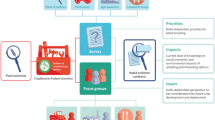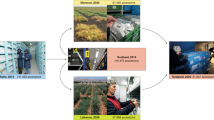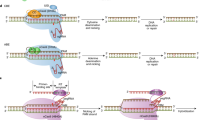Abstract
Which option for regulating plants derived from new genomic techniques in European Union law is feasible and justifiable scientifically? The European Commission has proposed a new regulation on plants obtained by specific new genomic techniques, which is now subject to discussion in the legislative process. From the perspective of the European Commission’s envisaged legal reforms of European Union law towards the integration of greater sustainability, we conclude that the option focusing on plant traits delivering sustainability benefits should be chosen, which is most fitting to facilitate a contribution to climate action, the transition towards climate neutrality, and promptly integrate sustainability into all food-related policies. To assist the decision-making in the legislative process, we outline six regulatory options resulting from regulatory research involving interdisciplinary teams.
This is a preview of subscription content, access via your institution
Access options
Access Nature and 54 other Nature Portfolio journals
Get Nature+, our best-value online-access subscription
$29.99 / 30 days
cancel any time
Subscribe to this journal
Receive 12 digital issues and online access to articles
$119.00 per year
only $9.92 per issue
Buy this article
- Purchase on Springer Link
- Instant access to full article PDF
Prices may be subject to local taxes which are calculated during checkout
Similar content being viewed by others
References
FAO. Gene Editing and Agrifood Systems (FAO, 2022).
Smith, V., Wesseler, J. H. H. & Zilberman, D. New plant breeding technologies: an assessment of the political economy of the regulatory environment and implications for sustainability. Sustainability 13, 3687 (2021).
Study on the Status of New Genomic Techniques under Union Law and in Light of the Court of Justice Ruling in Case C-528/16 (European Commission, 2021).
Judgment of 25 of July 2018, Confédération Paysanne and Others, Case C-528/16, EU:C:2018:583 (CJEU, 2018).
Purnhagen K. How to manage the Union’s diversity: the regulation of new plant breeding technologies in Confédération Paysanne and others. Common Market Law Rev. 56, 1379–1396 (2019).
Purnhagen, K. P. et al. EU court casts new plant breeding techniques into regulatory limbo. Nat. Biotechnol. 36, 799–800 (2018).
Jorasch, P. Potential, challenges, and threats for the application of new breeding techniques by the private plant breeding sector in the EU. Front. Plant Sci. 11, 582011 (2020)
Purnhagen, K. P. & Wesseler, J. H. Maximum vs minimum harmonization: what to expect from the institutional and legal battles in the EU on gene editing technologies. Pest Manag. Sci. 75, 2310–2315 (2019).
EFSA Panel on Genetically Modified Organisms (GMO) et al. Updated scientific opinion on plants developed through cisgenesis and intragenesis. EFSA J. 20, e07621 (2022).
Kalaitzandonakes, N., Willig, C. & Zahringer, K. The economics and policy of genome editing in crop improvement. Plant Genome 16, e20248 (2023).
Constable, A. et al. History of safe use as applied to the safety assessment of novel foods and foods derived from genetically modified organisms. Food Chem. Toxicol. 45, 2513–2525 (2007).
Custers, R. & Dima, O. Genome-Edited Crops and 21st Century Food System Challenges (Publications Office of the European Union, 2022).
Eriksson, D. et al. A comparison of the EU regulatory approach to directed mutagenesis with that of other jurisdictions, consequences for international trade and potential steps forward. New Phytol. 222, 1673–1684 (2019).
Buchholzer, M. & Frommer, W. B. An increasing number of countries regulate genome editing in crops. New Phytol. 237, 12–15 (2023).
Sprink, T., Wilhelm, R. & Hartung, F. Genome editing around the globe: an update on policies and perceptions. Plant Physiol. 190, 1579–1587 (2022).
Commission Staff Working Document Impact Assessment Report Accompanying The Document Proposal For A Regulation Of The European Parliament And Of The Council on Plants Obtained by Certain New Genomic Techniques and Their Food and Feed, and Amending Regulation (EU) 2017/625 (European Commission, 2023).
Acknowledgements
This publication is based upon work from several projects: the GeneBEcon project ‘Capturing the Potential of Gene Editing for a Sustainable BioEconomy’, funded by the Horizon Europe funding programme under the grant agreement 4107547 in the period 2022–2025; the Deutsche Forschungsgemeinschaft (DFG) and Oberfrankenstiftung (OFS) project ‘Regulating Food Innovation – Technical Innovation requires Regulatory Innovation’, project numbers: 465588286 (DFG); FP00535 (OFS). The opinions expressed by authors from the Federal Office of Consumer Protection and Food Safety (BVL; D.B., J.K. and K.U.) do not represent the position of the German Government.
Author information
Authors and Affiliations
Contributions
Project administration: D.E., X.T.S. Writing the original draft: Y.A., K.P., D.B., D.E., P.J., J.K., M.K., A. Molitorisová, A. Monaco, A.K.N., J.R., N.R., K.U., X.T.S. Reviewing and editing: Y.A., K.P., D.B., D.E., P.J., J.K., M.K., A. Molitorisová, A. Monaco, A.K.N., J.R., N.R., K.U. and X.T.S.
Corresponding author
Ethics declarations
Competing interests
K.P. is a member of the Task Force on Sustainable Agriculture and Innovation at the think tank Re-Imagine Europe. P.J. is employed by Euroseeds which is an industry umbrella organization representing the European seed and breeding sector. N.R. is as an expert in the European Food Safety Authority Panel on Genetically Modified Organisms and a chair of the EFSA Molecular Characterization Working Group. A.K.N. is employed by Plants for the Future ETP, a platform representing the farming community, the seed and breeding sector and academia.
Peer review
Peer review information
Nature Plants thanks Steffi Friedrichs and the other, anonymous, reviewer(s) for their contribution to the peer review of this work.
Additional information
Publisher’s note Springer Nature remains neutral with regard to jurisdictional claims in published maps and institutional affiliations.
Rights and permissions
Springer Nature or its licensor (e.g. a society or other partner) holds exclusive rights to this article under a publishing agreement with the author(s) or other rightsholder(s); author self-archiving of the accepted manuscript version of this article is solely governed by the terms of such publishing agreement and applicable law.
About this article
Cite this article
Purnhagen, K., Ambrogio, Y., Bartsch, D. et al. Options for regulating new genomic techniques for plants in the European Union. Nat. Plants 9, 1958–1961 (2023). https://doi.org/10.1038/s41477-023-01570-2
Received:
Accepted:
Published:
Issue Date:
DOI: https://doi.org/10.1038/s41477-023-01570-2



